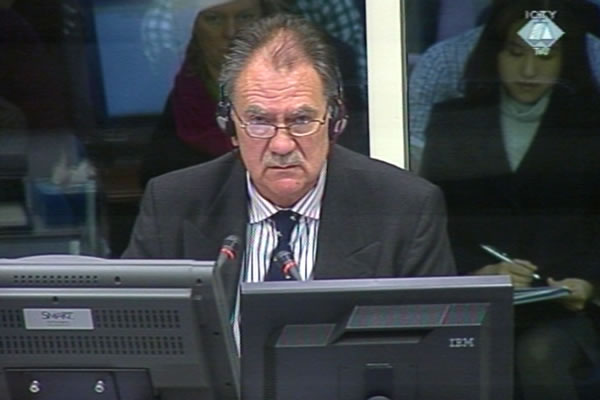Home
KARADZIC’S WITNESS: BOSNIAN GOVERNMENT KILLED PEOPLE IN SARAJEVO
Richard Gray, a colonel from New Zealand, contends that killing people in Sarajevo was part of a general strategy pursued by the Bosnian government to provoke an international intervention. In the examination-in-chief, Gray claimed that Karadzic ‘had a genuine interest in peace’. However, in the cross-examination, the witness denied that what he was quoted as saying in the New York Times, that ‘Serbs wanted peace’ was true
 Richard Gray, defence witness of Radovan Karadzic
Richard Gray, defence witness of Radovan Karadzic Radovan Karadzic’s defense continued its case today with the evidence of New Zealander Richard Gray, a former UN military observer in Sarajevo. Gray’s written statement was admitted into evidence together with the excerpts from a book by Canadian general Lewis MacKenzie, the first UNPROFOR commander in Bosnia and Herzegovina.
From April 1992, Gray was the chief operations officer in charge of the UN military observers’ program. From 11 June to 20 September 1992, Gray was a senior military observer. In his statement to Karadzic’s defense, the witness claimed that the BH Army snipers fired at the UN staff in the PTT building in Sarajevo. The snipers allegedly opened fire from nearby buildings and from the Students Halls of Residence in Nedzarici. Gray said that protests were lodged with the Bosnian authorities.
Colonel Gray contends that the BH Army opened fire from movable mortars deployed in close proximity to the Kosevo Hospital to make the Serb side return fire and hit civilian buildings. For the same reasons, the BH Army tanks were placed in the immediate vicinity of the PTT building; the UN staff in the building were thus used as a shield. Gray blamed the BH Army for the incident on 13 July 1992 in which a group of Sarajevo teenagers were shelled as the UN staff from Canada were throwing candy at them from the roof.
Gray is convinced that the Bosnian government engineered the incidents in which the people in Sarajevo were killed was part of a general strategy aimed at provoking an international intervention. This, in Gray’s view, was proved when the BH Presidency building was shelled on 7 July 1992 during the visit of British minister Douglas Hurd. That day, a shell killed and wounded ten passers-by. Gray claims that the shell was fired from a distance of about 200 meters. He concluded that the round had been fired from a position under the control of the Bosnian forces.
Gray also contends that the Sarajevo TV ‘stoked the fire’ against Bosnian Serbs. That made the television building a legitimate military target. During his encounter with Karadzic and Mladic in August 1992, Gray said he concluded that the RS president ‘had a genuine interest’ in stopping the fighting and avoiding civilian casualties.
In the cross-examination, the witness confirmed that in some of the shelling incidents in Sarajevo it was ‘obvious’ that the Serb forces intended to ‘bring’ the civilians ‘to their knees’. The witness mentioned the shelling of the Town Hall and the factory where the people had their gas cylinders filled as examples of attacks aimed at destroying the people’s morale.
The prosecutor quoted excerpts from the diary of Stjepan Siber, a BH Army general. On 29 July 1992, the general notes that Colonel Gray found himself ‘between the rock and the hard place’, that ‘Serbs are lying’ to him when they told him they only returned fire. Gray admitted that himself, Siber writes, because military observers saw what happened and reported it to the command. The witness first dismissed Siber’s claims, but then admitted that he had been in a difficult position and that it had been hard for the UN military observers to say who fired first.
The witness was then shown an article published in the New York Times on 31 July 1992, quoting him as saying that ‘Serbs wanted peace’. The witness confirmed that the quote ‘doesn’t reflect my thoughts’. The witness didn’t remember saying anything of the sort. As he explained, journalists often misinterpreted his words. New York tabloids even portrayed him as a war criminal, he said.
Linked Reports
- Case : Karadzic
- 2012-11-07 KARADZIC’S WITNESS: ‘WE WERE CAUTIOUS’
- 2012-11-07 PEACE INITIATIVES AND ATTACKS IN RAJLOVAC
- 2012-11-06 ‘JOINT COMMISSION’: DID IT REALLY EXIST?
- 2012-11-12 KARADZIC’S WITNESS DENIES ‘PUNISHMENT SHELLING’
- 2012-11-13 KARADZIC HOPES ORIC MIGHT HELP HIM
- 2012-11-13 MORE EVIDENCE ABOUT VRS ‘DEFENSIVE’ OPERATIONS IN SARAJEVO
